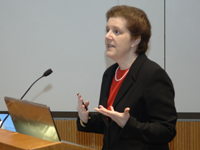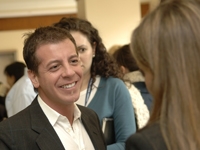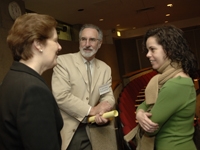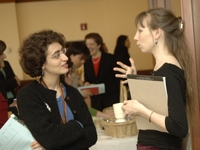
Dr. Elizabeth Ross discusses career opportunities for postdoctoral associates at the Tri-Institutional Career Symposium.
Postdoctoral associates from Tri-Institutional partners Weill Cornell, The Rockefeller University and Sloan-Kettering Institute heard advice on the best ways to transition into science careers during a day-long symposium hosted by Weill Cornell on March 24 that featured professionals from academia, industry and alternative careers, each of whom delivered a presentation on their career and participated in an audience-led panel discussion. In addition to some reassuring words from panelists, the symposium also provided a forum for the kind of networking that nearly all speakers agreed was the cornerstone of any successful scientific job search.
"Eventually our postdoc positions are going to end and the hope for most of us is to be a principal investigator. So the goal of the symposium was to focus on what we can do to help us get there," said Leonardo Pignataro, a Weill Cornell postdoctoral associate and the principal organizer of the event. However, because most postdocs will not become tenured faculty in academia, an additional goal of the symposium was to expose postdocs to the range of opportunities for science Ph.D.'s both in and out of academia.

Leonardo Pignataro, a postdoctoral associate in the Department of Anesthesiology.
"One of the key missions of the Office of Postdoctoral Affairs is to provide up-to-date career information for science Ph.D.'s and opportunities to acquire the skills necessary for a variety of careers. It is very important that postdocs are encouraged to pursue careers that best match their own unique skills, interests and lifestyle," said Karen Sherman, administrative director of the Office of Postdoctoral Affairs.
According to Dr. Elizabeth Ross, professor of neurogenetics at Weill Cornell, academic search committees are looking for excellence in research, both demonstrated and potential, but students need a value-added skill that makes them a unique addition to the institution. And networking, in the form of attending faculty meetings, asking questions and organizing events, can be critical to making a name for a rising scientist. As one panelist succinctly put it, "Science is a personality-driven business. People hire people they know and like."
From the industry panelists, Dr. George Yancopoulos' career exemplifies the fast-paced, high-risk science of biotech and pharma companies. After postdoc work in molecular immunology at Columbia University, Yancopoulos had achieved what he had long thought was his dream: a faculty appointment at Columbia and an eight-year, $1.5 million Lucille P. Markey Scholar Award. Then he did the unthinkable.

Dr. Ross speaks with Dr. Joel Pardee, faculty director of the Office of Postdoctoral Affairs, and Cristina Cebrian, a former postdoc at Weill Cornell.
He turned it down and helped start a biopharmaceutical company, working out of an acquaintance's apartment with enough capital to last a week.
Now 17 years later he is a member of the National Academy of Sciences and one of the most highly cited scientists in industry, proving that "high science" can be practiced in a market-driven environment. But Regeneron, the company he helped launch, has yet to make a major commercial breakthrough and reported a net operating loss of nearly $100 million in 2005.

Hanna Pincas (left), a postdoc in the Department of Microbiology and Immunology, and Emilene Nandrot, a postdoc in the Department of Ophthalmology.
Beyond academic and industry speakers, the symposium also featured scientists with alternative careers, including a science writer, a consultant, a lobbyist and a patent lawyer. With so many choices, the proposition of launching a career could seem daunting.
"It's important to stay optimistic, in your science and your life," said Dr. Joel Pardee, associate dean of the Weill Graduate School of Medical Sciences and faculty director of the Office of Postdoctoral Affairs. "It's very important to follow that dream."
The advice is not lost on Pignataro, who hopes for a career in academia: "We didn't become scientists because there was sign on the door that said 'Scientist Wanted.' We became scientists to be scientists and if you stay and insist, you will make it."
Photos by Amelia Panico.

